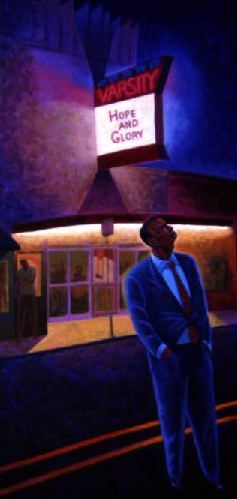Summary of The Moviegoer
(With a multiple-choice quiz)
Winner of the National Book Award, 1962
Summary by Edward Dupuy, PhD, Louisiana State University
 Told entirely from the perspective of John Bickerston ("Binx") Bolling, who describes himself as "a moviegoer living in New Orleans," The Moviegoer follows the life of Binx during the final week of Mardi Gras during the late 1950s. The novel begins on the Wednesday before "Fat Tuesday" and ends on Ash Wednesday, the day after Mardi Gras, with the epilogue providing a subtle and implicit resolution of the novel's action.
Told entirely from the perspective of John Bickerston ("Binx") Bolling, who describes himself as "a moviegoer living in New Orleans," The Moviegoer follows the life of Binx during the final week of Mardi Gras during the late 1950s. The novel begins on the Wednesday before "Fat Tuesday" and ends on Ash Wednesday, the day after Mardi Gras, with the epilogue providing a subtle and implicit resolution of the novel's action.
In tone, rhythm, and action reminiscent of Camus' L'etranger (The Stranger), The Moviegoer begins with Binx's receiving a note from his Southern aristocratic Aunt Emily. From this point forward, Percy weaves a story abundant with seemingly disconnected episodes of supposedly haphazard digressions and memories on Binx's part. The narrative, in short, does not follow a more traditional linear development, but is probably best describable as recursive — as a series of repetitions in which key subjects are briefly mentioned, dropped, and then later retrieved again and again to reinforce for the reader the predicament that the novel's protagonist is immersed in.
A successful stock and bond broker, Binx, in his late twenties, actually lives in a rented basement apartment in Gentilly, a suburb of "The City." He finds this habitat useful for the "search" he is involved in, a search whose goal is indeterminate throughout most of the novel, but which finds at least a tentative, suggestive resolution in the end. Binx regularly visits his Aunt Emily, who lives in the Uptown section of the city with her husband, Jules Cutrer, and her stepdaughter, Kate Cutrer. Kate has attempted suicide in the past and is receiving treatment from a psychiatrist. Kate and Binx can share and discuss the strange "malaise" that haunts their situation. To avoid the malaise, Binx pursues frequent love affairs with the series of secretaries who work for him. He goes to the movies as an attempt to understand the malaise and the "peculiar aura" of movie stars. The movies, he thinks, are "onto something," and from his rounds in the city he comes to develop theories based on the results of his search. Binx's relationship with his family is disjointed at best. His father is dead, a medical doctor turned pilot, shot down in the "wine dark sea" near Crete, and his mother is remarried into the Smith family, which provides Binx with a number of stepbrothers and sisters, one of whom (Lonnie) is crippled and toward whom he develops a special devotion.
Like the narrator in Kierkegaard's Diary of a Seducer, Binx occupies himself with the seduction of his secretaries up until his Uncle Jules sends him to a stock convention in Chicago. Kate ends up going with him on the trip, and on the train ride North, they decide in something of a peculiar fashion to get married. Kate does not tell Aunt Emily that she is going with Binx, and because Kate has recently attempted an overdose of sleeping pills, Aunt Emily is concerned for her well-being. She summons the two home as soon as she discovers their whereabouts, and in grand fashion, chastises Binx for his carelessness. In frustration, she asks him: "What do you love? What do you live by?", questions to which Binx is unable to provide an answer. The reader thus learns indirectly that Binx's search has all along been for those very things his aunt is questioning him about, although he cannot accept the standard answers offered by his culture, by his aunt, or by his mother's family. He must find his own way.
The Epilogue tells of Binx's abandoning his stock business in favor of marrying Kate and attending medical school. In the powerful scene of a visit to the dying Lonnie in the hospital, Binx affirms the choice of life over death, and makes the broadened decision to commit himself not only to the needs of Kate, but also to all the Smith children, who are no longer his stepbrothers and sisters, but simply brothers and sisters.
Assignments and additional resources:
QUIZZES
-
The Moviegoer Quiz: Take the interactive The Moviegoer Quiz (multiple-choice for all levels)
(For the self-grading version, download the PDF version) -
A Walker Percy Primer Quiz:
Take this 12-question interactive
True-False Quiz about Walker Percy
after reading
The Project's A Walker Percy Primer to confirm your core knowledge about Percy's writing career. (for all levels)
READINGS
- Short Biography: A Walker Percy Primer
- Essay: Read "Walker Percy and Southern Literature" by Veronica Makowsky, PhD.
ASSIGNMENTS
- Student Assignment: Submit a written response to The Moviegoer in the Project's Personal Stories Forum.
- Graduate Student Assignment: Submit a Scholarly Book Annotation.
To purchase a copy of The Moviegoer:
Visit the Project Bookstore
Original Art ©James Janknegt, "Hope and Glory"
